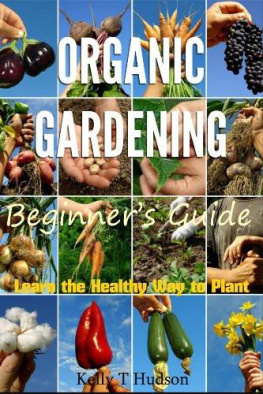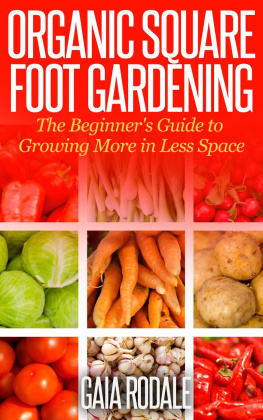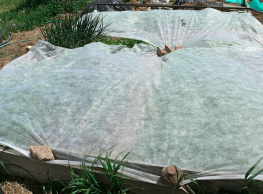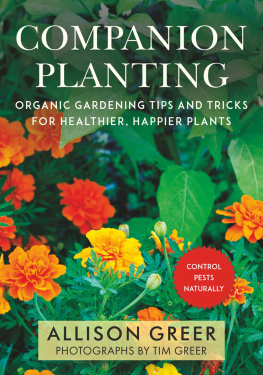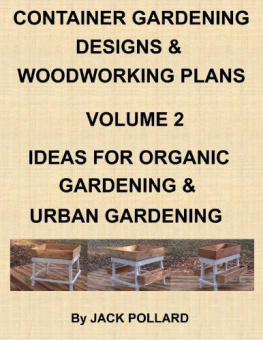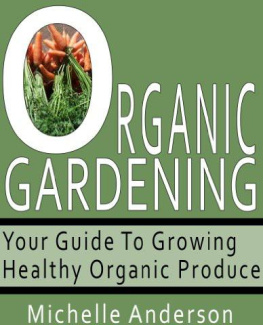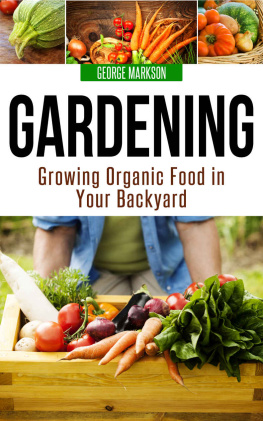Organic Gardening Beginners Guide
Learn the Healthy Way to Plant
Disclaimer
All Rights Reserved. Any content of this publication cannot be replicated or transmitted by any means or in any form including electronic, print, photocopying, recording, or scanning without written consent from the publications author.
The author has tried to be an authentic source of the information provided in this report. However, the author does not oppose the additional information available over the internet in an updated form. The objective of providing basic information and different tips of growing organic flowers and plants is to help beginners do their best in organic gardening. The information included in this book cannot be compared with the guidelines provided in other books related to organic gardening. All readers can seek further help through additional sources of information.
Ignoring any of the guidelines or not following the gardening instructions may lead to getting unfavorable results. Therefore, the author is not responsible for such negligence.
Table of Contents
How Will This Book Help You Become A Great Organic Gardener?
Welcome to your own organic garden! Yes, you can do it even if you are planting seeds for the first time. This book has been designed to facilitate you with the basic knowledge you should have before going for organic gardening. Since planting different kinds of seeds requires detailed know-how of making your own organic garden, there are many concepts you should keep in mind before experimenting with planting fruits and vegetables.
Understanding specific guidelines mentioned in this book will not only help you enhance your gifted gardening skills, you will also be able to save a lot of time practicing how to plant fruits and vegetables the right way, and in the right season.
Furthermore, this book includes various tips and tricks, suggestions, and an entire step-by-step process to begin your organic gardening the right way.
Introduction to Organic Gardening
What Actually Is Organic Gardening?

Simply put, organic gardening is a unique way to plant flowers, fruits, and vegetables without using any chemicals, pesticides, fertilizers, and other synthetic products that could harm these plants. Ideally, making your garden organic can replenish the resources while using them.
In addition, rather than using artificial products for fertilization of soil, organic gardening requires the use of organic matter, i.e. dried leaves, compost, kitchen scraps, animal waste, and grass clipping. This is how you can feed the soil naturally. When the soil is fed naturally, it feeds the plants the same way.
Things You Can Plant

You can come up with all the fruits and vegetables, even those you may like to use in cooking. So, plant anything you like, such as garlic, tomatoes, potatoes, spinach, peppers, and beets.
What You Should Have To Begin Organic Gardening
Gardening Tools

Some of the gardening tools will make it easier for you to maintain plants growth. So, before you begin to plant a seed, make sure that you have your own gardening tools available at home.

Water
You will need to water the organic plants according to their types as well as their seasons. So, store clean water in advance.
Botanical Pesticides

Though pesticides are not what an organic garden will require, it definitely needs botanical pesticides to maintain the health of plants as well as the soil. Secondly, these types of pesticides play a significant role in terms of controlling pests.
Patience!
As a beginner, you will come across situations in which you cannot see immediate results, even if you have treated the soil of your garden perfectly. This is quite normal. Your first try will not necessarily result in success. The best way to handle this is to have patience and persistence. Slowly and gradually, you will learn how to excel at organic gardening. Remember that it all comes with practice. So, take your time, and keep applying useful tips to make your organic garden.
Organic Gardening The Guidelines
Who doesnt like eating chemical-free fruits and vegetables that came right from their own garden? Serve these to your guests and they will love them too! However, many people believe that organic gardening is not something everyone can do. In reality, it is actually the opposite, i.e. anyone can do this easily. If you have the passion and willingness to plant organically, all you need to know is how to do it.

Here are the basic step-by-step guidelines to help you become a great organic gardener:
Select Your Plot

Plan where you want to set up your organic garden. You have endless options if you have around fifty acres of land. However, this is definitely not possible for everyone. So, having even a small backyard garden in your house will be the perfect place to begin with organic gardening. Choosing one of the following options will help you select the plot that is best for you:
The Ground

If you do not want to spend money on buying containers or soil, then you have an even better option, i.e. the ground. Growing plants directly on the ground will provide them the benefit of natural organisms. This will help your organic garden thrive for a longer period of time. Since earthworms already exist in the ground, they contribute well to the plants growth by breaking down other plant and animal matter into essential nutrients. In addition, they will aerate the soil.
Obviously, ground-growing will require you to put maximum efforts into it, but it is actually worth it because you can apply different gardening techniques in this healthier soil, even for years.
How to Choose the Right Type of Ground

If you have selected your backyard as the ground to start off with organic gardening, then you must know a few things before moving further. First of all, choose the soil that comprises of sand, clay, silt, and compost. However, most backyards do not contain an equal ratio of these elements. To ensure that you begin with the right kind of ground, use a shovel after clearing out the grass. Now, turn the soil to mix it well throughout the ground.
Raised Bed

Next page
